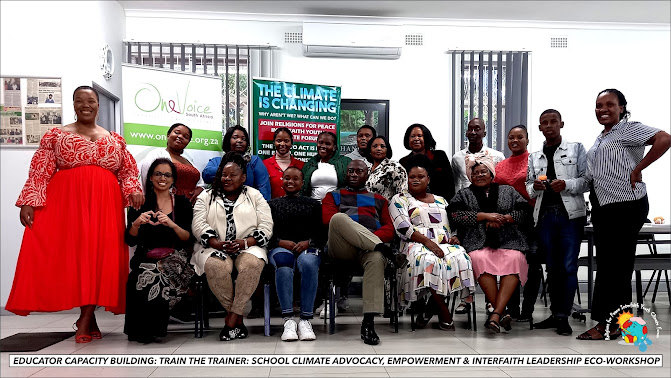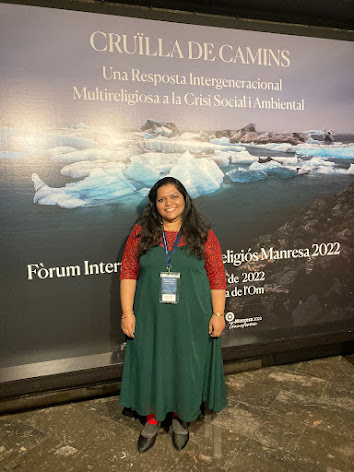“Be the change that you wish to see in the world.”
In this presentation I will focus on only three of the many causes and effects of environmental degradation. These are:
1. Climate change
2. Food sovereignty and
3. Violence and armaments production.
And then I will suggest some ways in which we can make a difference, among many others.
1. Climate change and our experiences
In the past few weeks in the province of Kwa Zulu Natal, in South Arica we have been grappling with the massive devastation caused by the heavy rainfall experienced a few weeks ago. This is a phenomenon which is not a part of our "normal" weather pattern. Although occasional storms over the centuries are not an uncommon feature, the frequency of these in recent times is a cause for concern. The distortion in the climate generally and in particular when it is accompanied with unprecedented storms and winds has had a lasting effect on communities all over the world. The human pain and suffering and major distortions in the eco system have and are having a major impact on life generally around the world. According to scientists these occurrences are a result of a number of factors but included in them is the continued degradation of our environment.
2. Food Sovereignty:
Why food sovereignty and not food security? Very quick explanation is that food security is used by many companies to further their own ends and impose a financial burden on the masses while enriching themselves at the expense of environmental damage and deprivation of the rights of humanity to self sustenance through the manufacture of genetically modified seeds so people can no longer use their own naturally collected free seeds to grow vegetables. Food sovereignty therefore means taking control over our own food production.
While we have seen the effects of the storm on our doorstep and the sad consequences of these kinds of extreme weather patterns, there are also a number of other consequences not so obvious to the general public. These are the experiences of farmers who cannot predict weather and hence their timing of the cycle of planting and harvesting has been disturbed with dire consequences on food supply. Water shortages and pollution of water resources as a result of mudslides and human negligence are further experiences. Life has become extremely difficult especially for those living on the margins of our society.
When Gandhiji opted to live away from the comforts of city life in rural unserviced areas, among the poor and the exploited people, his personal experiences taught him a number of life lessons among which were issues of environmental degradation, interpersonal relations, culture of intolerance and violence and the need to consciously bring about changes in all these.
At his first and second ashrams in South Africa, the Phoenix Settlement and Tolstoy farm he began to experiment with ways to conserve and keep the environment clean. This is what he wrote in 1910.
“In spite of the large number of settlers, one could not find refuse or dirt anywhere on the Farm. All rubbish was buried in trenches sunk for the purpose. No water was permitted to be thrown on the roads. All waste water was collected in buckets and used to water the trees. Leavings of food and vegetable refuse were utilized as manure. A square pit one foot and a half deep was sunk near the house to receive the night soil, which was fully covered with the excavated earth and which therefore did not give out any smell. There were no flies, and no one would imagine that night soil had been buried there. ….If night soil was properly utilized; we would get manure worth laths of rupees and also secure immunity from a number of diseases. By our bad habits we spoil our sacred river banks and furnish excellent breeding ground for flies with the result that the very flies which through criminal negligence settle upon uncovered night soil defile our bodies after we have bathed.” P. 240 Satyagraha in South Africa –by M.K. Gandhi referring to Tolstoy Farm
If only we learned from these experiences 112 years ago maybe our climate would not be so harsh, maybe our rivers will not be so badly polluted, maybe we would not be using so much of chemicals and artificially manufactured substances in our farming, maybe we would not be suffering with water shortages and power outages as our rivers and our atmosphere would be saved from polluting influences of our modern lifestyles, and maybe over a third of our population would not be going to bed hungry. So we see that these words resonate even today as we witness and many try desperately to prevent further pollution of our rivers and of our sea.
3. Violence and weapons of mass destruction:
We also see that our continued dependence on violence to deal with conflicts has its effects on the environment as countries in their mad rush to seek power are frantically building and acquiring more and more powerful weapons of all kinds and in particular weapons of mass destruction. Some have been used and others are precariously kept in readiness. These have the potential to destroy our earth. We have already seen its devastating effects on many places where the weapons have been used e.g. Hiroshima and Nagasaki, where they have been tested e.g. Semipalatinsk, and where accidents have occurred in their production e.g. Fukushima. Strong lobbies calling for disarmament, calling for an end to nuclear weapons and an end to wars fall on deaf ears.
Gandhiji wrote in the Harijan in 1938
"If the mad race for armaments continues it is bound to result in a slaughter such as has never occurred in history. If there is a victor left the very victory will be a living death for the nation that emerges victorious."
Chiara Lubick in the mid 20th century in Italy started a whole movement the Fokolare movement against war and for the care of returning soldiers and their families. She said, "Life is a time of trial and at the end of it too, an exam has to be taken. But in His infinite love God has already told us what questions we will be asked: “For I was hungry and you gave me food; I was thirsty and you gave me drink”. The works of mercy will be the subject of the exam, and in them God will see if we have truly loved Him by serving Him in our neighbour."
This is a powerful testimony against the viciousness of War and use of weapons of mass destruction. Today we have weapons that have the ability to destroy many hectares of land eco systems and people in an instant. We are seeing right now that war may seem to be far away for many of us and we can turn away and not do anything but we know that, its effects will be felt by us and by the world in many ways.
4. The Way forward:
The time is now for us to act and take steps to save our environment, to stop violence and advocate for a culture of nonviolence and conservation of our scarce resources.
To this end then let us consider how we can help to conserve our environment. Some suggestions I would like to make are:
Let us move away from the mad consumerist culture that we have imbibed in the past century.
Let us look at how we can conserve nature e.g. reduction of emissions, ill effects of chemicals, plastic and many other issues in respect of how we are contributing to environmental degradation.
To combat hunger let us encourage developing food gardens, water harvesting, energy conservation and
Let us try to help each other through the harsh economic climate we are faced with
Let us conserve our natural resources so that following generations may have access to these resources as well.
Our strength lies in our unity and our unity can only be built on the path of truth, love compassion and natural justice. So let us strive towards a united effort to move towards a life style that will help to take care of our environment."
Visit our Facebook page to be informed of upcoming events: https://www.facebook.com/RFP.IYCF





Comments
Post a Comment